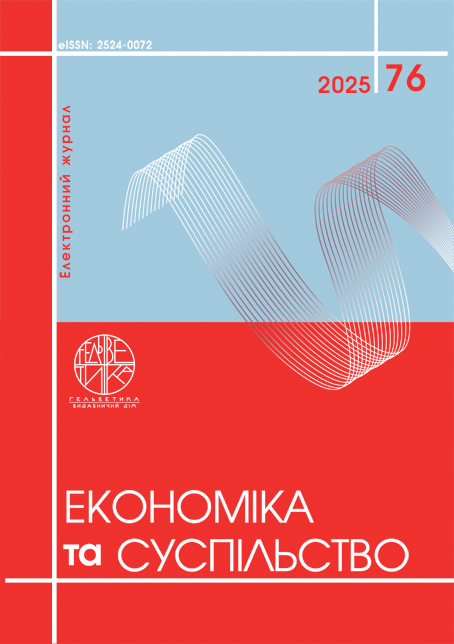INNOVATION-ORGANIZATIONAL AND COMMUNICATIVE-ECONOMIC PARADIGM OF MANAGEMENT: A METHODOLOGICAL FOUNDATION FOR SUSTAINABLE DEVELOPMENT IN THE ARCHITECTURE AND CONSTRUCTION SECTOR
Abstract
The article substantiates the innovative-organizational and communicative-economic management paradigm as a methodological foundation for the transformation of an architectural and construction company in the context of sustainable spatial renewal. The proposed paradigm serves as an integrated management model that combines digital technologies, adaptive organizational practices, value-oriented governance, and socially responsible stakeholder engagement. The theoretical framework of the study is formed based on the analysis of current scientific sources, which confirm the growing role of digital transformation, soft management skills, ESG approaches, and partnership cooperation in modern construction. The concept is based on seven strategic components: the innovation component, organizational flexibility, communication strategy, value-oriented management, social responsibility, economic efficiency, and the professional competence of the manager.
References
Liu Z., Liu Y., Osmani M. (2024). Integration of Smart Cities and Building Information Modeling (BIM) for a Sustainability-Oriented Business Model. Buildings, vol. 14(5), art. 1458. DOI: https://doi.org/10.3390/buildings14051458
Pan Y., Zhang L. (2023). Integrating BIM and AI for Smart Construction Management. Archives of Computational Methods in Engineering, vol. 30, pp. 1081–1110. DOI: https://doi.org/10.1007/s11831-022-09830-8
Scheuer C.-L. et al. (2023). Decentralized Leadership and Knowledge Sharing in Cross-Functional Teams. Journal of Management & Organization, vol. 29(1), pp. 139–158. DOI: https://doi.org/10.1017/jmo.2020.37
Olujimi P. A., Ade-Ibijola A. (2023). NLP Techniques for Automating Responses to Customer Queries: A Systematic Review. Discover Artificial Intelligence, vol. 3(20). DOI: https://doi.org/10.1007/s44163-023-00065-5
Baquero A. (2022). Net Promoter Score (NPS) and Customer Satisfaction: Relationship and Efficient Management. Sustainability, vol. 14(4), art. 2011. DOI: https://doi.org/10.3390/su14042011
Bosi M. K. et al. (2022). Sustainability Reporting through Environmental, Social, and Governance (ESG): A Bibliometric Review. Sustainability, vol. 14(19), art. 12071. DOI: https://doi.org/10.3390/su141912071
Sahu A. et al. (2025). ESG Disclosure and Green Building Adoption: A Global Panel Study. Socio-Ecological Practice Research, vol. 7, pp. 77–91. DOI: https://doi.org/10.1007/s42532-024-00209-6
Faruqui N. et al. (2025). Gen-Optimizer: A Generative AI Framework for Strategic Business Cost Optimization. Computers, vol. 14(2), art. 59. DOI: https://doi.org/10.3390/computers14020059
Zare J., Persaud A. (2024). Digital Transformation and Business Model Innovation: A Bibliometric Analysis. Management Review Quarterly. DOI: https://doi.org/10.1007/s11301-024-00426-z
Ramaci T. et al. (2019). Psychological Flexibility and Mindfulness as Predictors of Individual Outcomes. Frontiers in Psychology, vol. 10, art. 1302. DOI: https://doi.org/10.3389/fpsyg.2019.01302
Costa J., Pádua M., Moreira A. C. (2023). Leadership Styles and Innovation Management: What Is the Role of Human Capital? Administrative Sciences, vol. 13(2), art. 47. DOI: https://doi.org/10.3390/admsci13020047
Jotabá M. N., Fernandes C. I., Gunkel M., Kraus S. (2022). Innovation and Human Resource Management: A Systematic Literature Review. European Journal of Innovation Management, vol. 25(6). DOI: https://doi.org/10.1108/EJIM-07-2021-0330
Maharani I. A. K., Alfina A., Indawati N. (2024). Strategic Leadership and Organizational Innovation: Bibliometric Overview (1993–2022). Journal of Scientometric Research, vol. 13(3), pp. 849–865. DOI: https://doi.org/10.5530/jscires.20041230
Prusov D., Makatora D., Kubanov R. (2024). Methodological basis of bim-analysis of damage and assment of impacts, consequences, resources for restoration of buildings and structures. Strength of Materials and Theory of Structures, vol. 112, pp. 302–315. DOI: https://doi.org/10.32347/2410-2547.2024.112.302-315; Available at: http://omtc.knuba.edu.ua/article/view/305597
Makatora D., Kubanov R. (2024). Theoretical and methodological bases for implementing the creative management technology «factory of ideals» into architectural and construction company. Modeling the development of the economic systems, vol. 4, pp. 193–199. DOI: https://doi.org/10.31891/mdes/2024-14-26; Available at: https://mdes.khmnu.edu.ua/index.php/mdes/article/view/472/468
Kubanov R., Makatora D., Kushyk-Strelnikov Y. (2024). Organising effective interaction of managers of architectural and construction companies with clients based on the theory of non-violent communication. Economy and Society, vol. 70. DOI: https://doi.org/10.32782/2524-0072/2024-70-44; Available at: https://economyandsociety.in.ua/index.php/journal/article/view/5297
Copyright (c) 2025 Анастасія Михалко, Руслан Кубанов, Дмитро Макатьора

This work is licensed under a Creative Commons Attribution 4.0 International License.


